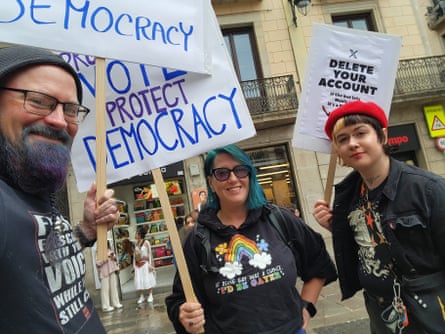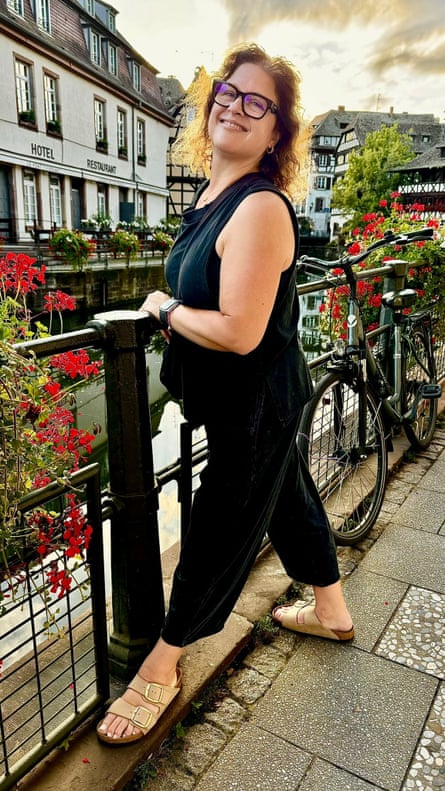The scramble began in November as news broke that Donald Trump had been re-elected. Benjamin and Chrys Gorman had long said they would leave the US before seeing Trump inaugurated again, giving them exactly 76 days to sell their home, cars and most of their belongings and move four people, three dogs and two cats to Barcelona.
“I was saying: we’ve got more time than that, it won’t go that fast,” said Gorman. “My wife said no, we need to be out of here – not just on inauguration day, but a few days before. And she was so right.”
Within hours of taking office, Trump signed an executive order defining sex as only male or female. The change was to be reflected on official documents, sowing confusion over what it meant for Americans with the non-binary identification of “X” in their passports.
Relief gripped the Gormans as they watched it play out from afar. “Our kid’s passport has an X gender marker,” said Gorman. “So we managed to escape just in time.”

Since Trump’s return to power, relocation firms from London to Lisbon and Madrid to Milan say they’ve seen a surge in inquiries from Americans. Undaunted by the gains made by the far right across the continent, many Americans cite a desire to escape the US’s increasingly polarised climate and an administration whose wide range of targets has included immigrants, diversity measures and political opponents.
Statistics suggest that the barrage of interest is translating into action; in the first two months of the year, US applications for Irish passports were at their highest level in a decade – up 60% from the same period last year. In the first three months of the year, France reported a rise in the number of long-stay visa requests from Americans, while in March, the number of Americans who had solicited British citizenship in the 12 months before surged to its highest since record-keeping began in 2004.
While the figures remain relatively small given the size of the US population, the movement has been galvanised by a steady drip of celebrity announcements. Rosie O’Donnell said in March that she had moved to Ireland, describing it as “heartbreaking to see what’s happening politically” in the US, while Ellen DeGeneres recently cited Trump’s re-election to explain why she and her wife, Portia de Rossi, had moved to the Cotswolds in 2024. Earlier this month, Jimmy Kimmel revealed that he had acquired Italian citizenship, saying that the US under Trump was “just unbelievable”.
Across Europe, governments and institutions have sought to capitalise on the exodus, launching programmes aimed at attracting stateside talent or, in the case of one enterprising Italian village, seeking to bolster its population with disgruntled Americans.
Among the first was France’s Aix-Marseille University, which in March put out an offer of “scientific asylum” for researchers reeling from Trump’s crackdown on academia. Three months later, the university said it had received more than 500 inquiries for the 20 spots.

Those selected included Lisa, a biological anthropologist who was preparing to move her husband, a school teacher, and two children across the Atlantic. “When Trump was re-elected, the feeling was: ‘We gotta go,’” she told the Guardian earlier this summer. She asked that her last name not be used to protect her university in the US from reprisals.
The sentiment had strengthened as she watched the Trump administration take aim at universities, dismantle research funding and undermine science. “We’re months into this presidency, and a lot has already happened. I can’t imagine what’s going to happen in another three and a half years.”
The opportunity to swap the northern US for southern France was welcome, but not without its drawbacks. “It is a big pay cut,” she said. “My kids are super gung-ho. My husband is just worried that he won’t find a job. Which is my worry too, because I don’t think I’ll be able to afford four of us on my salary.”
In January, as thousands of Trump faithful turned up in Washington DC for a televised viewing of his inauguration, Deborah Harkness knew the time had come to act on her longstanding dream of moving to southern Spain. “As soon as he was inaugurated, I started making plans,” she said.
Months later she was in Málaga, watching as Trump’s administration sought to drastically reshape the judiciary, public broadcasting, higher education and immigration. “What frightens me most is how normalised it’s all become,” she said. “The chaos, the cruelty, the disinformation – that’s how authoritarianism takes hold.”
The view was echoed by Monica Byrne, who in 2023 left North Carolina for Cork, Ireland. Trump was a factor in her decision, but only in that she saw his rise to power as a symptom of the bigger issues facing the US. “I didn’t know whether Trump specifically was going to come back, but I knew fascism was,” she said. “So it was more about the abject failure of the Democrats and knowing they weren’t going to protect us from fascism generally.”

Trump’s re-election cemented her decision to remain abroad and enrol in a master’s programme in Ireland. “I get frustrated when people say: ‘You’re very lucky or you must be happy you’re not there,’” she said. “There is some degree of that, but 90% of the people I care about and love are in the States and are affected.”
In Barcelona, Gorman and his family have been slowly settling into the rhythms of the city. “So many things have just been shockingly better,” he said. “For example, my wife was saying that the other day she was walking along La Rambla and a car backfired. And she was the only person who ducked.”
While they were thrilled to have left behind the gun violence and shooter drills of the US, the challenge was now in explaining to their loved ones that they were unlikely to return home once Trump’s term ends. “I don’t foresee this movement ending with the end of the Trump administration … I think that the rot is much deeper,” said Gorman.
“If he wouldn’t have a huge base of support, Trump is just, you know, your crazy uncle yelling things on a porch. That base of support needs to be addressed. Why was there support for this kind of fascism?” he added. “And that’s a much deeper question. I would not personally feel safe going back to a country that doesn’t fully reckon with its fascist impulses.”

 German (DE)
German (DE)  English (US)
English (US)  Spanish (ES)
Spanish (ES)  French (FR)
French (FR)  Hindi (IN)
Hindi (IN)  Italian (IT)
Italian (IT)  Russian (RU)
Russian (RU)  3 weeks ago
3 weeks ago
























Comments